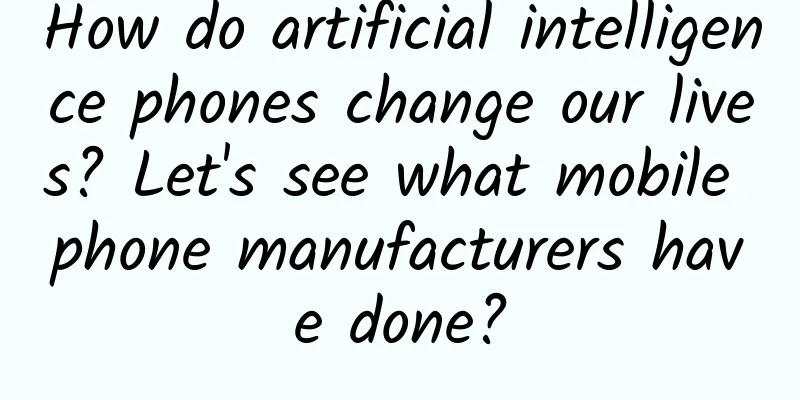How do artificial intelligence phones change our lives? Let's see what mobile phone manufacturers have done?

|
From "intelligent voice assistants" that can chat with you to smart speakers that can control various home appliances, from facial payment to driverless cars, from machine translation to smart education...artificial intelligence has penetrated into all areas of production and life.
This year's World Telecommunication Day on May 17th has the theme of "Promoting the legitimate use of artificial intelligence (AI) for the benefit of mankind", once again focusing on leveraging the potential of artificial intelligence to help people live a better life. In the face of innovations in artificial intelligence, the mobile phone industry has also quietly set off a wave of artificial intelligence, and many mobile phones have begun to incorporate AI functions and elements. However, due to different application scenarios, mobile phone manufacturers have different footholds. Huawei: Building hardware AI capabilities Algorithms, computing power, and data are considered the three pillars of AI technology. The current machine learning algorithm's demand for big data indirectly puts forward requirements for computing power, so AI technology has taken the lead in putting forward higher requirements for chips in hardware. Huawei's layout in AI also started with AI chips. In September 2017, Huawei released the world's first mobile phone AI chip Kirin 970. The biggest highlight is the addition of the neural network processing unit NPU, which is a processor customized for AI-related calculations. When processing the same AI application tasks, Kirin 970 can be 25 times faster than a normal CPU and 6.25 times faster than a combination of CPU+GPU. In terms of energy efficiency, NPU is 50 times that of CPU and 6.25 times that of GPU.
With NPU, the mobile phone can transfer part of the work of voice and semantic recognition to the local phone, improve the performance of voice and semantic recognition, and improve the experience of voice interaction applications (such as smart assistants) in the mobile phone. In terms of photography, NPU can help the phone identify the shooting scene more accurately and quickly, allowing the phone to select the most appropriate image processing algorithm, and make the phone more accurate in processing edge blur when the dual-camera background is blurred. For AR, NPU can significantly increase the rendering speed and reduce power consumption. Currently, Huawei's Mate 10 and P20 flagship phones are equipped with the Kirin 970 AI chip. Yu Chengdong said that AI is the general trend of the future development of the mobile phone industry, and Huawei will further develop and enhance its capabilities in the future. This is just the beginning, and the algorithm capabilities will be stronger in the future. Huawei will do more things that everyone thinks of but cannot do, and things that everyone can't even think of. Samsung: Bixby can talk and see Last year, Samsung equipped the Galaxy S8 with its self-developed artificial intelligence platform "Bixby" and began to provide the "Bixby Voice" service. In fact, before Samsung, many mobile phone manufacturers have launched their own voice assistants, but Samsung's Bixby is closer to our ideal experience of artificial intelligence.
Bixby AI assistant has four modules: "Vision", "Voice", "Homepage" and "Reminder", which can make the mobile phone smarter and understand the user better. In terms of intelligent voice, Bixby not only has higher voice recognition ability and more natural communication sentences, which can bring a closer sense of real conversation between people, but also supports nearly 20 leading mainstream third-party applications including WeChat, Weibo and iQiyi, covering all scenarios of social, travel, surfing the Internet, shopping, entertainment and office. In terms of visual functions, Bixby can not only realize text recognition and translation, QR code recognition, shopping information search, wine year query, location recognition and other operations through camera framing, but also supports text extraction and editing, search for similar pictures and other functions. When you see an item you like in life, you can find its sales page and other information online by just scanning it with Bixby; when we get a paper document and want to share the content with friends or colleagues, we can extract the text content by just scanning it with Bixby for editing and sharing. Deep learning capabilities make Bixby smarter. Bixby has strong adaptive learning capabilities. After a period of voice communication, Bixby will ask you whether you are satisfied with the communication process. If you are not satisfied, Bixby will ask you to help revise the problematic recognition content and the corresponding functions. Through continuous learning, Bixby can not only communicate with you more accurately and efficiently, but also predict in advance what you want to do next. OPPO: AI technology applications that are more tailored to users OPPO's philosophy for artificial intelligence is that "technology must be applied to products to solve certain user pain points or meet certain needs in order to demonstrate its value." Technically, OPPO deeply integrates artificial intelligence technology with mobile phone systems, hardware, and service capabilities, allowing mobile phones to more proactively and intelligently solve problems for users. From the perspective of user needs, OPPO understands that users want mobile phones to meet more functional needs, as well as more personalized and emotional demands.
In terms of the camera function that users value most, OPPO launched the first product with AI technology, the "OPPO R9s" in 2016. Through the clever use of AI technology, the mobile phone can accurately achieve the depth of field effect with only one camera. The latest generation of OPPO R15 further expands different beauty functions through AI technology. For example, the camera technology of OPPO R15 makes the subject look natural and beautiful. It can automatically identify the specific scene at the time and intelligently match the most suitable beauty solution according to the different face shapes of users around the world, thus making up for the shortcomings of the camera technology of previous mobile phones. In April this year, OPPO officially established the OPPO Research Institute, of which AI technology is one of the main directions of the OPPO Research Institute. Liu Chang, director of the OPPO Research Institute, said: "In the development of many artificial intelligence products, OPPO always follows the product design concept of dual-wheel drive of user needs and cutting-edge technology to inject more humanity into AI. vivo: Jovi Assistant emphasizes autonomous learning capabilities Compared with well-known artificial intelligence assistant engines such as Siri and Cortana, the biggest difference of vivo Jovi is that it does not support voice interaction, but focuses on "intelligent scene application". As the time of using mobile phones continues to increase, Jovi can see and hear the user's habits, rules, range of activities and other information, and then actively provide users with high-quality solutions after summarizing and thinking, and can also actively remind users of tickets, air tickets and route navigation when users have forgotten some small details of life. Of course, Jovi can also answer various questions of users like Siri, allowing users to feel the warmth and convenience of technology.
vivo has built a meticulous pyramid architecture for Jovi to support its continuous evolution. Generally speaking, vivo hopes to perceive the user's current scene by analyzing the unified smart home interface, sensor data, and revolutionary algorithms, and then analyze, calculate, and make decisions based on information input from dozens of dimensions such as sound, image, and video, and finally integrate vivo's own capabilities and industry vertical services to bring personalized smart services to users' lives. Specifically in life, the Jovi artificial intelligence assistant can provide many rich functions such as AI smart scenes, AI smart driving, parking and finding cars, AI game engine, AI smart desktop, AI smart screen recognition, etc. For different scenarios, Jovi will provide users with different service solutions. For example, when Jovi recognizes that when a user is using a mobile phone, 3 hours are spent playing games and 2 hours are spent chatting on WeChat in 5 hours of screen time, Jovi can provide better services for games and social software in terms of performance and compatibility through algorithms. In addition, by introducing third parties with vertical service capabilities through quick applications, Jovi provides users with convenient services including train ticket booking, air ticket management, hotel reservations, express reminders, and urban transportation, which can be used immediately. Shi Yujian, chief technology officer of vivo, said, "Breaking users' original usage habits and cognition through artificial intelligence technology is the mission of vivo artificial intelligence." |
>>: Android is not secure, Google is not clear
Recommend
When the trend has become a thing of the past, Lei Jun's Xiaomi mobile phone has turned from a myth into a joke
"Do you know what Xiaomi's flagship phon...
Aizhan.com shows that it is under maintenance. What is the reason why it cannot be opened?
Aizhan.com is a website data query website freque...
This setting in "Guardians of the Galaxy 3" has sparked heated discussion. Is there really an "anti-Earth" behind the sun?
In the recently released "Guardians of the G...
A Scientific Genius Dancing in the Wind: Commemorating the 60th Anniversary of von Karman's Death
Theodore von Karman is a representative figure in...
Do a good job of scene marketing and let users chase your activities
Have you all been flooded with Wu Yifan's Fre...
Can iPhones be used for medical research? Here's what Stanford professors say
Since 2007, more than 1 billion iPhones have been...
Memory is the basic skill of learning and working! Who is the dream weaver of the memory network in the brain?
Memory is the basic skill of learning and working...
Is Papi Jiang really hard to replicate?
The short video industry started to boom in 2016....
5 Marketing Methods of Brand Live Streaming
Marketing should go where consumers' attentio...
How should different industries choose information flow platforms? Take this report for reference!
2017 is still a period of rapid development for i...
The latest version of the 2020 live streaming e-commerce operation methodology, it is recommended to collect it!
Looking back at the live streaming e-commerce boo...
Is it unethical for African children to hold up signs to express birthday wishes or promote advertisements? Can children get wages?
Today, as videos of African children shouting and...
31 data truths about Bilibili
Bilibili is a platform that marketers cannot ignor...
If you want to learn how to cook at home, please learn how to read recipes first!
Mixed Knowledge Specially designed to cure confus...
Technological Evolution——Witness at GITC2014
In the blink of an eye, 20 years have passed. On ...









